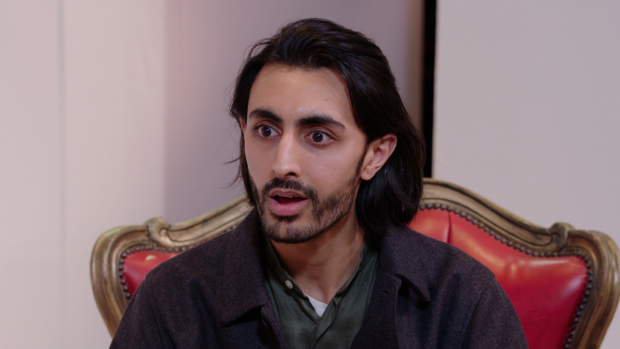Review: The Importance of Being Earnest (Lawrence Batley Theatre, The Dukes in Lancaster, online)

Billed as "a very modern take on Oscar Wilde's classic comedy", Yasmeen Khan's North of England-set, Asian-centric distillation, with its slapstick sound effects, fart jokes, double entendres and variable puns, actually feels more like a throwback to 1970s TV sitcom and the Carry On films. There's even the 'You Have Been Watching….' closing credits framework as seen in such old BBC bangers as Are You Being Served and It Ain't Half Hot Mum.
That's not to say it isn't funny – it mostly is – but references to modern phenomena such as Peaky Blinders, Instagram followers and "diversity, inclusivity…all the bandwagons", in the words of Algernon's manservant Lane, reimagined here by Divina De Campo as a tartly disdainful drag queen PA, feel more puzzlingly out-of-place than the nostalgia for late twentieth century TV comedy and game shows.
Khan has turned Wilde's epigram-spouting high society deceivers Jack and Algernon into struggling Asian actor Jamil, supplementing his floundering career by producing an online 'Reet Good Guide to the North' under the pseudonym of Ernest North, and popular movie star Algy, whose paths cross when the latter is filming a rom-com in the North. If Tom Dixon's likeable Algy could be more preeningly self-involved, Gurjeet Singh strikes precisely the requisite mix of vulnerability and vaulting ambition as Jamil: they make an engaging team.
Mina Anwar (who also directs) deftly invests the Lady Bracknell figure, now a hard-nosed property developer called Ms Begum (or "Ms By-Gum" as she's jokingly referred to at one point), with a surprising combination of charm and irascibility; her cosseted daughter Gwendolyn morphs into social media-obsessed Gul (Nikki Patel, delightful). Country girl Cecily Cardew has become New Age therapies-obsessed Safina ("but I've been manifesting like a bastard!") played with winning eccentricity by Zoe Iqbal. Both Jamil/Ernest and Algy/Ernest promise their beloveds a trip to Nando's and Khan's script is at its best when it riffs off the Wildean original: "Ernest, you're not going to any poultry establishment with this young woman, are you?"
There is also an affecting meditation on cultural appropriation and being true to ones heritage, delivered when Jamil fronts up – over Skype – to Paul Chahidi's amusing, grotesquely patronising big-time director, even if it does feel as though it belongs in another play entirely.
The self-consciously theatrical tone of Mina Anwar's digital production is similarly inconsistent – "too much?" enquires an actor to his scene partner after a dramatic outburst, head-mics are clearly visible in performers hair, the camera frequently panning away from the flimsy looking set into the auditorium of Huddersfield's Lawrence Batley Theatre – and it isn't clear whether the aim is to remint Wilde's well worn text for modern audiences, or to comment upon it. Furthermore, while the deliberately clumsy camera work successfully evokes the slipshod TV production values of yore, it sits uneasily alongside the slick into-camera video conversations the characters participate in.
Despite these misgivings, this co-production between The Dukes Lancaster and the Lawrence Batley Theatre is still a warmly enjoyable 75 minutes, in large part due to the performers. Melanie Marshall is a touchingly forlorn Miss Prism, not the puritanical schoolmarm we're used to but, to quote her enthusiastic pupil, "a multi-hyphenated renaissance woman", and Harriet Thorpe spins delicious comic gold out of Jamil's clueless agent, forever forgetting the name of her own client. Plus look out for hilarious cameos from Hugh Dennis and Sindhu Vee as a pair of grievously mismatched television presenters.
In all honesty, Oscar Wilde doesn't really require this sort of embellishment, but Yasmeen Khan makes a creditable, intermittently successful attempt at bridging the gap between multicultural modern Britain and the rarefied Edwardian milieu the original play was conceived in. Amusing on screen at home, I suspect it would be a whole lot more fun when watched with a theatre full of people.










